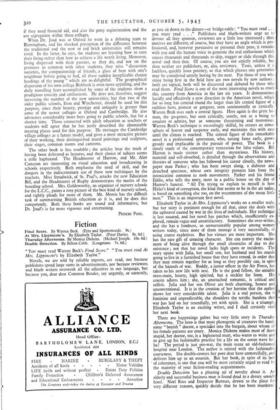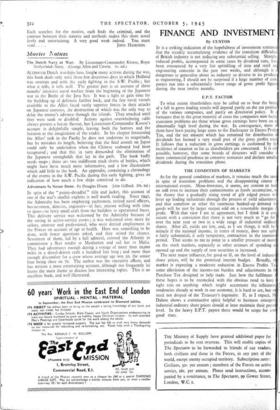Fiction
"You must read Warren Beck's Final Score." "You must read At Mrs. Lippincote's by Elizabeth Taylor."
Novels, we are told by reliable experts, are read, not because publishers spend large sums in advertisements, nor because reviewers and blurb writers overwork all the adjectives in our language, but because you, dear dear Common Reader, say urgently, or earnestly,
as you sit down to the dinner—or bridge-table: " You must read , . . you must read . . ." Publishers and blurb-writers urge us to devour all they sponsor, reviewers are a little less interested ; their motives are different, of course, but they have an angle which is pro- fessional, and, however persuasive or personal their pens, it remains with you and the human voice to generate the real enthusiasm which causes thousands and thousands to skip, stagger or slide through this novel and then that Of course, you are not strictly reliable, but then neither are publishers, or, alas, reviewers. Taste, unless it is faultless, quickly loses potency, so that which pleases one generation may be considered utterly boring by the next. For those of you who enjoy being first in the field here are two novels by new authors : both are topical, both will be discussed and debated by those who read them. Final Score is one of the most interesting novels to reach this country from America in the last six years. It demonstrates lucidly and effectively a new direction in the American novel, which for so long has centred round the larger than life central figure of a ruthless hero, pioneer or gangster, seen sentimentally or cynically. Warren Beck uses such a central figure. Here again is the great he- man, the go-getter, but seen critically, sanely, not as a being to emulate or admire, but as someone threatening and monstrous. Warren Beck's technique is exceedingly skilful, he creates an atmo- sphere of horror and suspense early, and maintains this with ease until the climax is reached. The central figure of this remarkable novel is a professional sportsman, who, tasting fame early, grows greedy and implacable in the pursuit of power. The book is a timely study of the contemporary veneration for false values. Bill Hutton is made sinister rather than mysterious. His history, material and self-absorbed, is detailed through the observations and theories of someone who has followed his career closely, the news- paper man Parker ; who has been swept along, a dubious and detached spectator, whose own integrity protects him from the intoxication common to mob movements. Parker and his friend Eddie, who tells the story, meet in a public house on the day of Hutton's funeral. "All I'm trying to explain to myself is how Hitler's kind of corruption, the kind that seems to be in the air today, is based on something else too, on the resentments of the mean little men." This is an important first novel.
Elizabeth Taylor in At Mrs. Lippincote's works on a smaller scale, but her story is pertinent enough for all that, since she deals with the upheaval caused by war in the lives of individuals. Her technique is less assured, and her novel has patches which, insufficiently ex- plored, remain vague and unsatisfactory. Sometimes she over-writes, and she has a fondness, so unwarrantably popular among women writers today, since none of them manage it very successfully, of using coarse expletives. But her virtues are more important. She has the rare gift of creating character. She can convey the excite- ment of being alive through the small chronicles of day to day existence ; not that her novel lacks high spots or incidents. The story opens with Julia, her small son, her husband and his cousin going to live in a furnished house that they have rented, in order that they may remain together for as long as they possibly can, in spite of the hazards of war. Roddy, a junior officer in the Air Force, has taken to his new life with zest. He is the good fellow, the amiable 21
mess-mate, hearty, high 'spirited, but a stickler for form. His cousin adores him ; she, an unattached romantic, is critical and selfish. Julia and her son Oliver are both charming, honest and unconventional. It is in the creation of her heroine that the author shows her very considerable talent. Julia is a real person, she is feminine and unpredictable, she shoulders the terrific burdens that war bas laid on her resentfully, yet with spirit. She is a triumph. Elizabeth Taylor is an exciting writer, and I shall certainly read her next book.
There are happenings galore but very little story in Thursday Afternoons. The hero is that most photogenic of creatures the hand-
some " boyish " doctor, a specialist into the bargain, about whom all his female patients are crazy. Monica Dickens makes most of them stupid, her doctor, too, is a bighearted mutt, who wants to write and to give up his fashionable practice for a life on the ocean wave ha!
ha! The period is just pre-war, the main scene an old-fashioned hospital near London. The author is tainted with the fashionable coarseness. She double-crosses her poor dear hero unmercifully, and delivers him up to an assassin. But her book, in spite of its lack of coherence, is one that you will be most certainly urged to read by the majority of your fiction-reading acquaintances.
Double Detection has a pleasing air of novelty about it. An elderly and successful business man is found dead in a dreary seaside hotel. Noel Ross and Inspector Burman, drawn- to the place for very different reasons, quickly decide that he has been murdered
Each searches for the motive, each finds the criminal, and the contrast between their natures and methods makes this short novel lively and entertaining. A very good week indeed. You must



























 Previous page
Previous page